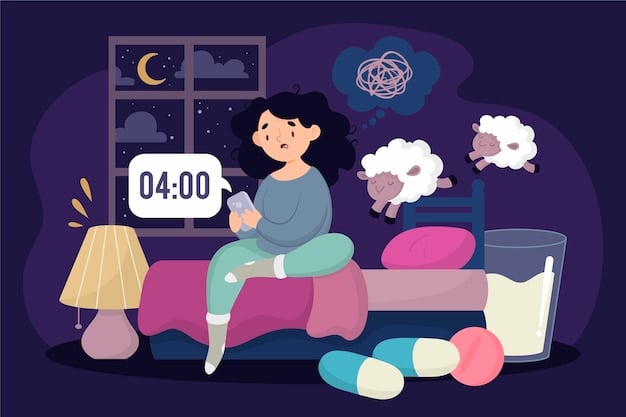Reset Your Sleep: A 7-Day Plan to Beat Stress and Reclaim Your Rhythm

Is Your Sleep Schedule Increasing Your Stress? Absolutely. A disrupted sleep pattern throws off your circadian rhythm, leading to increased stress levels, but a structured 7-day plan can reset your body’s natural clock and promote better sleep, reducing overall stress.
Is your erratic sleep schedule sabotaging your well-being? The link between inconsistent sleep and heightened stress is undeniable. Let’s explore Is Your Sleep Schedule Increasing Your Stress? A 7-Day Plan to Reset Your Circadian Rhythm, designed to help you regain control of your sleep and minimize stress, paving the way for a healthier, more balanced life.
The Vicious Cycle: Sleep Deprivation and Stress
The connection between sleep and stress is a two-way street. When you’re stressed, sleep often suffers. Conversely, when you’re consistently sleep-deprived, your stress levels tend to escalate. Understanding this cycle is the first step toward breaking free.
How Sleep Deprivation Fuels Stress
Sleep deprivation triggers a cascade of hormonal imbalances. The body releases more cortisol, the stress hormone, while suppressing melatonin, the sleep hormone. This hormonal imbalance disrupts the body’s natural stress response and makes you more reactive to stressors.
- Increased Irritability: Lack of sleep often leads to heightened irritability and mood swings.
- Impaired Cognitive Function: Concentration and decision-making abilities decline, increasing stress in demanding situations.
- Weakened Immune System: Chronic sleep deprivation weakens the immune system, making you more vulnerable to illness and adding to overall stress.
Stress Disrupts Sleep
Stress activates the sympathetic nervous system, responsible for the “fight or flight” response. This activation can make it difficult to fall asleep or stay asleep, leading to fragmented and restless nights. Chronic stress can also contribute to insomnia and other sleep disorders.

Breaking the cycle requires a conscious effort to prioritize sleep and manage stress. By understanding the interplay between these two factors, you can take proactive steps to improve both your sleep and your overall well-being.
Understanding Your Circadian Rhythm
Your circadian rhythm is your body’s internal clock, a roughly 24-hour cycle that regulates sleep-wake patterns, hormone release, body temperature, and other vital functions. When this rhythm is disrupted, it can have significant consequences for your health and stress levels.
How the Circadian Rhythm Works
The circadian rhythm is primarily regulated by light exposure, which signals the brain’s master clock, the suprachiasmatic nucleus (SCN), located in the hypothalamus. The SCN then sends signals to other parts of the brain and body to coordinate various functions according to the time of day.
Factors That Disrupt the Circadian Rhythm
Several factors can throw off your circadian rhythm, including:
- Inconsistent Sleep Schedule: Going to bed and waking up at different times each day is a major disrupter.
- Shift Work: Working night shifts or rotating shifts can severely interfere with the body’s natural clock.
- Travel Across Time Zones: Jet lag occurs when the circadian rhythm is out of sync with the local time.
Exposure to artificial light, especially blue light from screens, late at night can disrupt melatonin production and delay the onset of sleep. Other factors, such as caffeine, alcohol, and stress, can also negatively impact the circadian rhythm. Resynchronizing your circadian rhythm is essential for promoting healthy sleep and reducing stress.
Step 1: Setting the Stage – Optimizing Your Sleep Environment
A conducive sleep environment is critical for promoting restful sleep and a healthy circadian rhythm. Optimizing your bedroom can make a significant difference in your ability to fall asleep, stay asleep, and wake up feeling refreshed.
Creating a Sleep Sanctuary
Your bedroom should be a sanctuary dedicated to sleep and relaxation. Here are some key elements to consider:
- Darkness: Make sure your room is as dark as possible. Use blackout curtains or blinds to block out external light sources. Consider using a sleep mask if complete darkness is not achievable.
- Quiet: Minimize noise as much as possible. Use earplugs or a white noise machine to drown out distracting sounds.
- Temperature: Keep your bedroom cool, ideally between 60 and 67 degrees Fahrenheit (15.5 to 19.4 degrees Celsius).
Investing in Comfortable Bedding
Your mattress, pillows, and bedding play a crucial role in your sleep quality. Choose a mattress that provides adequate support and comfort. Select pillows that support your neck in a neutral position. Opt for breathable, comfortable bedding made from natural materials, such as cotton or linen.

By creating a sleep-friendly environment, you can significantly improve your sleep quality and start to regain control of your circadian rhythm. A consistent routine in a comfortable space signals to your body that it’s time to rest.
Step 2: Crafting a Consistent Sleep Schedule
A consistent sleep schedule is the cornerstone of a healthy circadian rhythm. By going to bed and waking up at the same time each day, even on weekends, you reinforce your body’s internal clock and promote regular sleep patterns. This consistency helps regulate hormone release and reduce stress levels.
The Importance of Regularity
When your sleep schedule is erratic, your body’s internal clock becomes confused, leading to difficulties falling asleep, staying asleep, and waking up feeling refreshed. Consistency helps synchronize your circadian rhythm with the external environment, resulting in improved sleep quality and overall well-being.
Aim to go to bed and wake up within the same hour each day. Initially, this may require some discipline, but over time, your body will adapt to the new schedule, making it easier to fall asleep and wake up naturally.
Dealing with Weekend Sleep In
Although it can be tempting to sleep in on weekends to catch up on lost sleep, doing so can disrupt your carefully crafted sleep schedule. A small amount of extra sleep is acceptable, but avoid sleeping in for more than one or two hours beyond your regular wake-up time.
Instead of sleeping in, focus on maintaining your regular sleep schedule and incorporating relaxation techniques to reduce stress and improve sleep quality. A consistent sleep schedule over time will help you feel more rested and energetic, even without the need for extra sleep on weekends.
Step 3: Natural Light Exposure and Darkness Discipline
Light is the primary regulator of the circadian rhythm. Strategic exposure to natural light during the day and strict adherence to darkness at night can have a profound impact on your sleep-wake cycle. This combination helps reinforce your body’s natural clock and reduce stress.
Harnessing the Power of Sunlight
Expose yourself to natural sunlight first thing in the morning. Open your curtains or go outside for a walk. Morning sunlight helps suppress melatonin production and signals to your brain that it’s time to be awake and alert. Aim for at least 30 minutes of sunlight exposure each morning.
Avoiding Blue Light Before Bed
Blue light emitted from electronic devices like smartphones, tablets, and computers can interfere with melatonin production and delay the onset of sleep. Avoid using these devices for at least one to two hours before bed. If you must use them, consider using blue light filters or apps that reduce the amount of blue light emitted.
Creating a dark and electronics-free environment in your bedroom before bed is crucial for promoting restful sleep. This discipline helps reinforce your body’s natural sleep-wake cycle and reduce stress levels.
Step 4: Optimizing Your Diet for Better Sleep
Your diet plays a significant role in your sleep quality and circadian rhythm regulation. Certain foods and beverages can promote sleep, while others can disrupt it. Making conscious dietary choices can help improve your sleep and reduce stress levels.
Foods That Promote Sleep
Include foods that contain tryptophan, an amino acid that the body converts into serotonin and melatonin, two hormones that promote sleep.
- Tart Cherry Juice: A natural source of melatonin.
- Almonds: Rich in magnesium, which helps relax muscles and calm the nervous system.
- Kiwi: Contains serotonin and antioxidants, which promote sleep.
Foods to Avoid Before Bed
Avoid consuming caffeine, alcohol, and heavy, fatty foods close to bedtime. Caffeine is a stimulant that can keep you awake. Alcohol can disrupt sleep patterns and lead to fragmented sleep. Heavy, fatty foods can cause indigestion and discomfort, making it difficult to fall asleep.
Timing your meals is important. Avoid eating large meals close to bedtime. Instead, opt for a light snack if you’re feeling hungry. A balanced diet throughout the day, combined with mindful eating habits, can contribute to better sleep and reduced stress.
Step 5: Relaxation Techniques for Stress Reduction
Stress is a major sleep disruptor. Incorporating relaxation techniques into your daily routine can help reduce stress levels and promote restful sleep. These practices help calm the mind, relax the body, and prepare you for a peaceful night’s sleep.
Mindfulness Meditation
Mindfulness meditation involves focusing your attention on the present moment without judgment. This practice can help reduce stress, anxiety, and racing thoughts. There are many guided meditation apps and online resources available.
Progressive Muscle Relaxation
This technique involves tensing and then releasing different muscle groups in your body. This exercise can help relieve muscle tension and promote relaxation. Start with your toes and work your way up to your head.
Deep Breathing Exercises
Deep breathing exercises can help calm the nervous system and reduce stress. Try the 4-7-8 breathing technique: inhale for 4 seconds, hold your breath for 7 seconds, and exhale for 8 seconds. Repeat several times.
Regular practice of relaxation techniques can significantly improve your sleep quality and reduce stress levels. Find a technique that works for you and incorporate it into your daily routine, especially before bedtime.
| Key Point | Brief Description |
|---|---|
| 🌙 Consistent Sleep | Set a regular sleep schedule to regulate your body’s natural clock. |
| ☀️ Natural Light | Expose yourself to sunlight in the morning and dim lights at night. |
| 🧘 Relaxation | Practice mindfulness or deep breathing to reduce stress before bed. |
| 🍽️ Diet Optimization | Avoid caffeine and heavy meals before sleep; opt for sleep-promoting foods. |
FAQ
▼
A consistent sleep schedule helps regulate your body’s circadian rhythm, making it easier to fall asleep and wake up feeling rested. It synchronizes your internal clock, improving overall sleep quality.
▼
Morning sunlight suppresses melatonin production, promoting wakefulness, while darkness triggers melatonin release, preparing your body for sleep. Managing light exposure is crucial for circadian rhythm regulation.
▼
Avoid caffeine, alcohol, and heavy, fatty meals close to bedtime. These substances can disrupt sleep patterns, cause indigestion, and make it difficult to fall asleep and stay asleep.
▼
Yes, relaxation techniques like mindfulness meditation, progressive muscle relaxation, and deep breathing can significantly reduce stress, calm the mind, and prepare your body for restful sleep.
▼
It’s best to avoid screens for at least one to two hours before bedtime. The blue light emitted from electronic devices can interfere with melatonin production, delaying the onset of sleep.
Conclusion
Reclaiming your sleep schedule is vital for managing stress and enhancing overall well-being. By implementing this 7-day plan, you can reset your circadian rhythm, reduce stress, and enjoy more restful, rejuvenating sleep, paving the way for a healthier, more balanced life.





